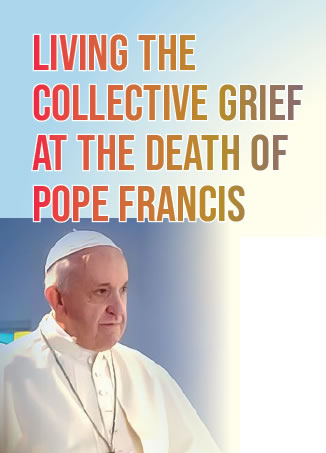When a prominent figure like Pope Francis passes, the grief isn’t just confined to his close family, friends, or immediate followers. It ripples across the globe, touching the lives of individuals who may have never met him but whose lives were deeply influenced by his teachings. This type of loss often leads to what psychologists call “collective grief”—a grief shared by a large group of people united by a common experience or loss. It’s a unique form of mourning because it extends beyond personal relationships, touching the very essence of a community’s identity and belief systems.
For many Catholics and people of faith, Pope Francis represented more than just a religious leader; he embodied the values of empathy, humility, and service to others. His death could cause a deep sense of disorientation or loss of direction for those who looked to him for spiritual guidance. This collective grief can manifest in various ways: increased feelings of sadness, a search for meaning, and even questions about the future of the Catholic Church and its leadership.
For believers, faith often plays a significant role in how they process grief. Many may turn to prayer, rituals, and the support of their religious community to navigate the emotional pain of losing someone they viewed as a spiritual father. Pope Francis’ death might also provoke reflections on themes of hope, eternal life, and the teachings of Christianity about life after death. His role as a bridge between faith and social issues may provide comfort to his followers as they honor his legacy.
At the same time, some individuals may experience a crisis of faith, especially if Pope Francis was their primary source of spiritual guidance. For those struggling with existential questions, his death could lead to feelings of uncertainty about the future, the role of the Church, or the direction of their own spiritual Journeys.
Grief, especially when it is shared on such a large scale, requires healthy outlets for expression. For individuals mourning Pope Francis, this could involve participating in memorial services, attending masses, or engaging in discussions about his teachings. These rituals not only allow for the expression of sorrow but also offer a sense of solidarity with others who are grieving. Engaging in community and collective activities, whether in religious spaces or online forums, can help alleviate the sense of isolation that often accompanies grief.
At the individual level, psychologists often encourage those coping with significant loss to allow themselves the time and space to mourn. This may involve journaling, talking with loved ones, or seeking professional support through therapy. For those affected by Pope Francis’ death, finding ways to honor his legacy, whether through acts of charity, continued advocacy for peace, or fostering unity, can serve as an important step in the healing process.
Another psychological challenge tied to the death of a figure like Pope Francis is the uncertainty about the future. His leadership represented stability, compassion, and inclusivity in an increasingly polarized world. His death raises questions about the future of the Catholic Church and its direction, which may create feelings of unease and apprehension. For some, this transition period might bring about anxiety or frustration as they face the unknown leadership that will follow him.
Yet, transitions—whether personal or communal—also provide an opportunity for growth and transformation. For the Catholic Church, Pope Francis’ death may create space for a new leader to emerge with fresh ideas, while still maintaining the core values of love and service that Pope Francis promoted. This transitional period may be an opportunity for followers to reflect on what Pope Francis’ teachings meant to them personally and how they can carry forward his vision.


